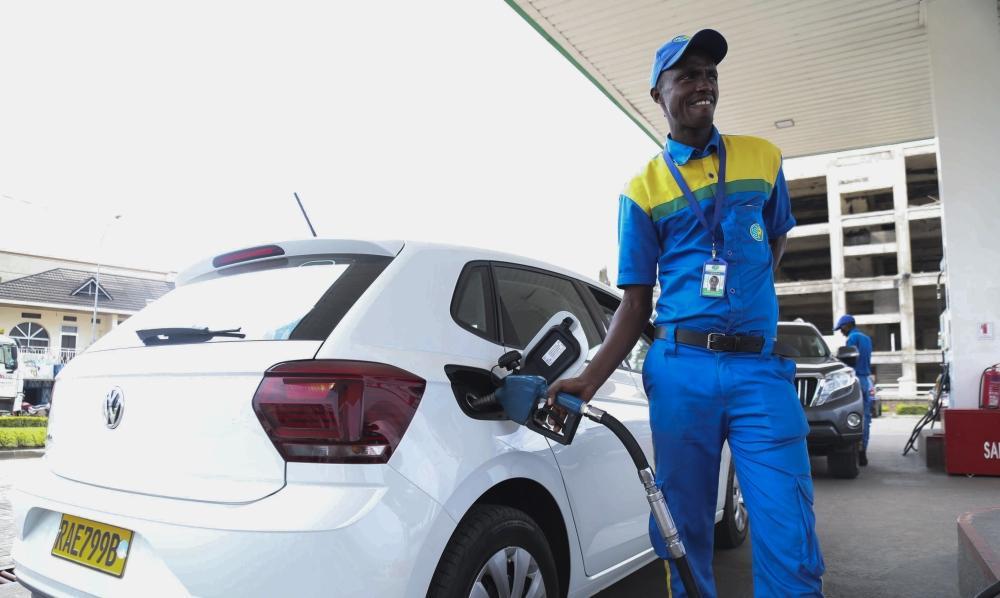Africa-Press – Rwanda. Rwanda Utilities Regulatory Authority (RURA) on Tuesday, July 1, announced revised fuel prices, citing shifts in global market trends and new tax measures aimed at supporting national development.
This first change in fuel prices since February is effective from 6:00 a.m, on Wednesday, July 2. According to the revised tariffs, the maximum retail price for gasoline (petrol) has increased from Rwf1,633 to Rwf1,803 per litre, marking an increase of Rwf170.
Diesel (automotive gasoil) prices increased from Rwf1,647 to Rwf1,757 per litre, reflecting a Rwf110 hike. This adjustment marks an 11 percent increase for petrol and 6.5 percent for diesel.
Why did fuel prices hike?
Infrastructure minister Jimmy Gasore explained that the price adjustments were influenced by fluctuations in the international oil market and the reintroduction of Value Added Tax (VAT) on fuel products, which took effect on July 1, following a Cabinet resolution passed on February 10.
“The Cabinet approved medium-term domestic resource mobilisation measures, including taxes and levies, to boost financing for the National Strategy for Transformation (NST2),” he said.
“We base fuel price adjustments on international purchase costs, transport and insurance fees, port charges, and local logistics. Since it takes two months for fuel to arrive on the Rwandan market, we revise prices every two months.”
Gasore clarified that VAT had not been included in recent fuel prices due to temporary exemptions introduced in response to the Covid-19 pandemic.
“Now that we’re focused on achieving NST2 targets, we are reintroducing VAT. All goods are supposed to be taxed in principle, and exemptions are temporary.”
How are government subsidies helping?
When fuel prices hiked globally and surpassed pre-covid-19 levels, the government adjusted its fuel subsidy intervention to help consumers cope with rising living costs.
As has happened in the past, Gasore noted that the government introduced subsidies to cushion the public from sharper increases.
“Without subsidies, petrol would have increased by 18 percent and diesel by 14 percent. However, with tax reductions, the increases were limited to 11 percent and 6.5 percent, respectively.”
The minister stressed that the interventions aim to protect consumers from a current effect that could affect transport and commodity prices.
Impact on transport and basic commodities
Antoine-Marie Kajangwe, the Permanent Secretary at the Ministry of Trade and Industry, said the fuel price hikes are not expected to cause drastic changes in commodity prices, especially food.
“Transportation contributes about 22 percent to the total cost of moving goods. The remaining 60 percent comes from wholesalers and retailers. This means the effect on final prices is minimal,” he said.
Providing examples, Kajangwe said the transport cost for rice from Rusizi to Kigali might increase by Rwf6 per kilo, maize from Nyagatare to Kigali by Rwf4, and Irish potatoes from Northern Province by Rwf4 per kilo.
“These are manageable increases, and as the government, we are closely monitoring the situation,” he noted, adding that Rwanda has sufficient food stocks and is approaching harvest season.
Restriction on unfair price hikes
Kajangwe also addressed concerns about some traders potentially taking advantage of the situation.
He said: “That’s why we’re explaining how the prices were calculated. Any unjustified price hikes are not permitted.
“We will continue market inspections and engage with private sector players to ensure compliance.”
Public transport fares unlikely to change
Regarding transport fares, Gasore said no major fare increases are expected, especially in the public transport sector and taxi-moto services.
“For operators with fixed agreements, there is a starting point at which we can consider reviewing fares. But the current increase does not warrant changes,” he said.
“For instance, if a moto ride costs Rwf500, and fuel typically accounts for Rwf200, a 10 percent increase in petrol prices would add only Rwf20. That doesn’t justify raising fares.”
He added that similar reasoning applies to taxis operating under regulated fare systems.
Why now?
Gasore emphasised that Rwanda’s broader development goals require sustainable financing.
“We want to grow our economy and meet NST2 targets. For that, everyone must contribute. Tax exemptions served their purpose during economic recovery, but now it’s time to restore normal taxation practices.”
The government assures the public that measures are in place to minimize the impact of fuel price changes on everyday life and to ensure a stable supply in addition to fair-trade practices across the country.
For More News And Analysis About Rwanda Follow Africa-Press






